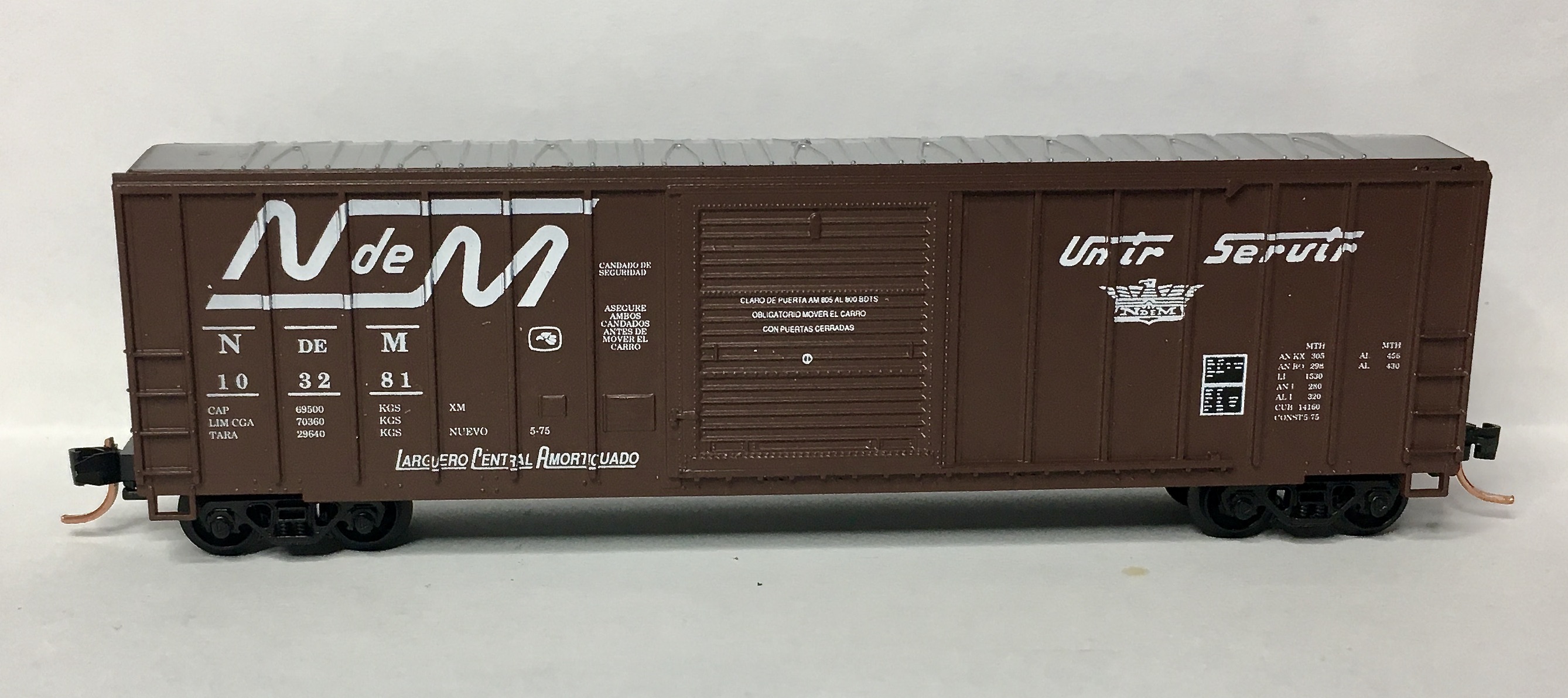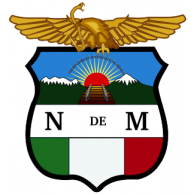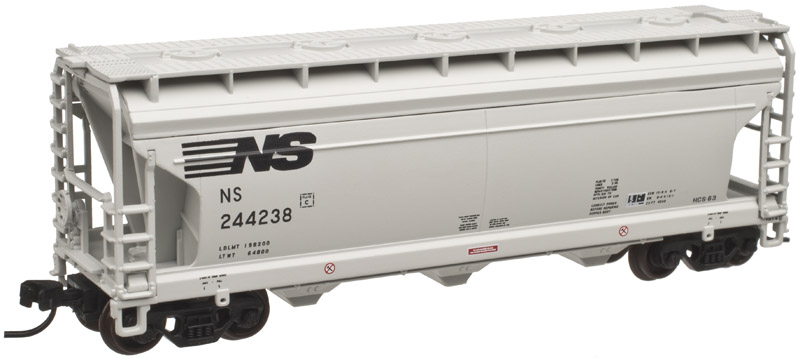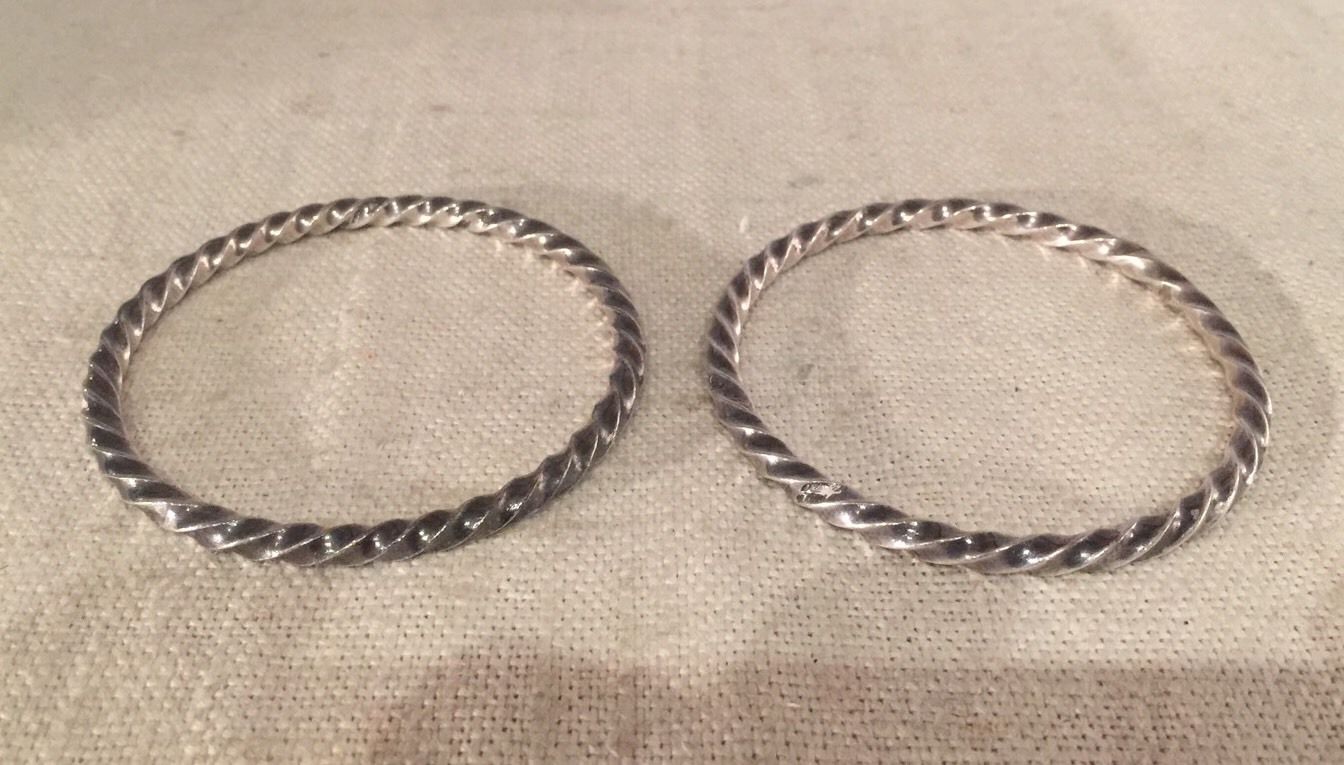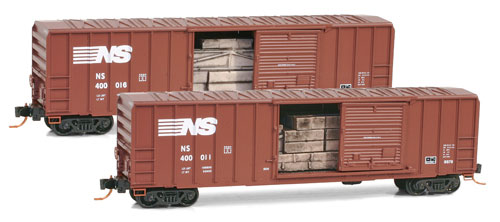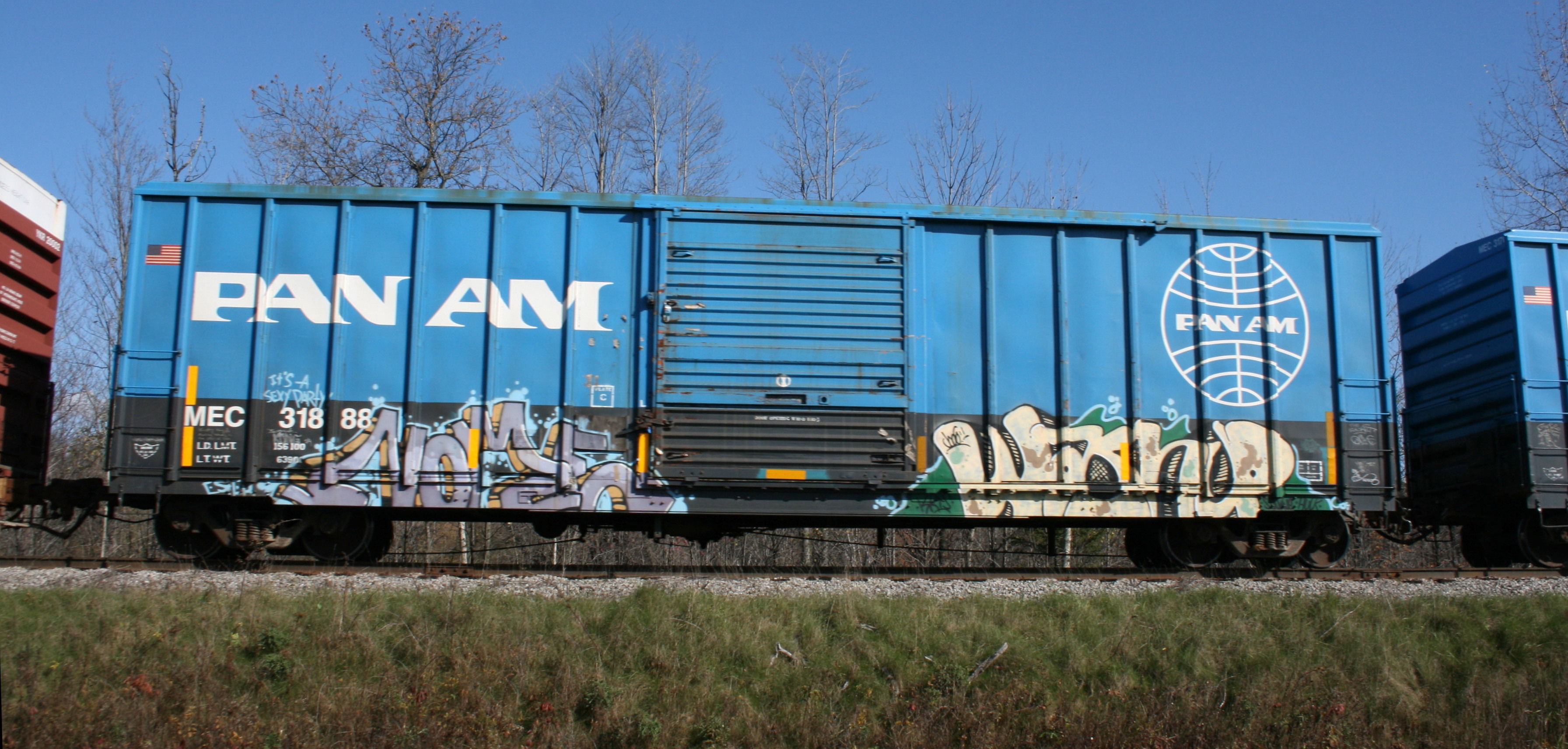Model Information: Single Sliding Door Rib Side Without Roofwalk FMC. Originally designed by MDC Roundhouse. This tooling was acquired by Athearn in June of 2004 and re-released under the Athearn name. The MDC releases referred to this tooling as "FMC 50 Foot Boxcar - Single Door". Athearn refers to them as "FMC 5347 Box Car(sic)", but they are the same model.
The MDC Roundhouse releases typically came as kits (though some later releases were RTR) with an unpainted pewter underframe and truck-mounted couplers and blackened low-profile metal wheels. The Athearn releases have a nicer set of wheels (also low-profile). The Athearn models are always Ready-to-Run (RTR). The Athearn models have painted (black) underframes that are also metal (likely pewter or whatever MDC used). Athearn moved the couplers to become body-mounted and changed the coupling system from Rapido to McHenry. After inspecting them closely, I am not sure they can be swapped for MTL couplers without filing off part of the underframe, but I could be wrong. This presents a problem as McHenry couplers don't always play well with other couplers on long consists where that is a lot of force on each coupling point. The body has remained unchanged with the only detail part being the brake wheel.
The newer releases of this body style (as of 2017) market this boxcar as specifically modelling the FMC 5347 prototype.
The MDC Roundhouse releases typically came as kits (though some later releases were RTR) with an unpainted pewter underframe and truck-mounted couplers and blackened low-profile metal wheels. The Athearn releases have a nicer set of wheels (also low-profile). The Athearn models are always Ready-to-Run (RTR). The Athearn models have painted (black) underframes that are also metal (likely pewter or whatever MDC used). Athearn moved the couplers to become body-mounted and changed the coupling system from Rapido to McHenry. After inspecting them closely, I am not sure they can be swapped for MTL couplers without filing off part of the underframe, but I could be wrong. This presents a problem as McHenry couplers don't always play well with other couplers on long consists where that is a lot of force on each coupling point. The body has remained unchanged with the only detail part being the brake wheel.
The newer releases of this body style (as of 2017) market this boxcar as specifically modelling the FMC 5347 prototype.
Prototype History: It was the mid 1970s, and the incentive per diem box car boom was just beginning. New, brightly painted box cars seemed to appear overnight. Many were lettered for various short lines. FMC (Food Machinery Corporation) was a significant builder of many of these cars. The 50’ outside post, non-terminating end box car, became the foundation for new per diem cars built in the 1970s. The 50’ FMC cars also varied in door configuration and style to better suit each customer. These cars can still be seen today at work (2017) on many ralroads.
The main difference between the 5077 cu. ft cars built by FMC vs the 5277-5347 cu. ft cars built by the same manufacturers is the overall height of the car, the smaller 5077 cars were Plate B while the larger 5277-5347 cars were Plate C.
The main difference between the 5077 cu. ft cars built by FMC vs the 5277-5347 cu. ft cars built by the same manufacturers is the overall height of the car, the smaller 5077 cars were Plate B while the larger 5277-5347 cars were Plate C.
Road Name History: Ferrocarriles Nacionales de México, (known as N de M originally, and FNM from 1987 to present) was Mexico's state owned railroad company from 1938 to 1998, and prior to 1938 (dating from the regime of Porfirio Diaz) a major railroad controlled by the government that linked Mexico City to the major cities of Nuevo Laredo and Ciudad Juarez on the U.S. border. The first trains to Nuevo Laredo from Mexico City began operating in 1903.
N de M absorbed the Mexican Central Railroad (Ferrocarril Central Mexicano, first section from Mexico City to Leon, Guanajuato, opened in 1882) in 1909, thus acquiring a second border gateway at Ciudad Juarez (adjacent to El Paso, Texas). The N de M was nationalized by President Lazaro Cardenas del Rio in 1938, and privatized 60 years later by President Ernesto Zedillo. N de M operated most railway trackage through the central and northeastern regions of the republic.
In 1995, the Mexican government announced that the FNM would be privatized and divided into four main systems. As part of the restructuring for privatization, FNM suspended passenger rail service in 1997, and the new arrangements applied from 1998. The companies were Kansas City Southern de Mexico, Ferromex, Ferrosur, and (owned jointly by the three companies) Ferrocarril y Terminal del Valle de Mexico or Ferrovalle which operates railroads and terminals in and around Mexico City.
As of 2006, the remaining parts of NdeM are in the process of liquidation.
N de M absorbed the Mexican Central Railroad (Ferrocarril Central Mexicano, first section from Mexico City to Leon, Guanajuato, opened in 1882) in 1909, thus acquiring a second border gateway at Ciudad Juarez (adjacent to El Paso, Texas). The N de M was nationalized by President Lazaro Cardenas del Rio in 1938, and privatized 60 years later by President Ernesto Zedillo. N de M operated most railway trackage through the central and northeastern regions of the republic.
In 1995, the Mexican government announced that the FNM would be privatized and divided into four main systems. As part of the restructuring for privatization, FNM suspended passenger rail service in 1997, and the new arrangements applied from 1998. The companies were Kansas City Southern de Mexico, Ferromex, Ferrosur, and (owned jointly by the three companies) Ferrocarril y Terminal del Valle de Mexico or Ferrovalle which operates railroads and terminals in and around Mexico City.
As of 2006, the remaining parts of NdeM are in the process of liquidation.
Brand/Importer Information:  MDC Roundhouse was founded in California in 1938 and relocated in 1993 to Carson City, Nevada due to statewide restrictions on painting. MDC Roundhouse was a producer of both RTR (Ready-to-Run) and kit versions of N Scale rolling stock as well as RTR locomotives. They entered the N scale market in 1979 with a Thrall Hi-Side Gondola and a Hi-Cube Single Door Box Car. MDC Roundhouse was purchased by Horizon Hobbies in June of 2004, when its owner since 1938 C. H. Menteer retired, and merged into their Athearn line.
MDC Roundhouse was founded in California in 1938 and relocated in 1993 to Carson City, Nevada due to statewide restrictions on painting. MDC Roundhouse was a producer of both RTR (Ready-to-Run) and kit versions of N Scale rolling stock as well as RTR locomotives. They entered the N scale market in 1979 with a Thrall Hi-Side Gondola and a Hi-Cube Single Door Box Car. MDC Roundhouse was purchased by Horizon Hobbies in June of 2004, when its owner since 1938 C. H. Menteer retired, and merged into their Athearn line.
Unlike many of their contemporaries which contracted with European firms to produce their products, MDC made their own toolings. They made several popular body styles and produced them for road names that many other vendors (even Micro-Trains) wouldn't touch. This made them popular with modelers. Also, their un-assembled "kits" permitted a lower price point so they were popular with "runners" as well as "modelers".
Of particular interest was the attention given to modern 50 foot steel boxcars. They made some attempt to accurately mold the differences into distinct models to represent each of the major prototype manufacturers products. They have distinct toolings not only for the different products from FMC, BFF and PS, but also multiple models for each of these manufacturers including "standard" vs "Youngstown" doors and "waffle" vs. "rib" sides. In total they produced 13 different versions of the 50 foot steel boxcar.

Unlike many of their contemporaries which contracted with European firms to produce their products, MDC made their own toolings. They made several popular body styles and produced them for road names that many other vendors (even Micro-Trains) wouldn't touch. This made them popular with modelers. Also, their un-assembled "kits" permitted a lower price point so they were popular with "runners" as well as "modelers".
Of particular interest was the attention given to modern 50 foot steel boxcars. They made some attempt to accurately mold the differences into distinct models to represent each of the major prototype manufacturers products. They have distinct toolings not only for the different products from FMC, BFF and PS, but also multiple models for each of these manufacturers including "standard" vs "Youngstown" doors and "waffle" vs. "rib" sides. In total they produced 13 different versions of the 50 foot steel boxcar.
Item created by: gdm on 2018-04-24 08:41:54. Last edited by CNW400 on 2020-06-11 16:08:59
If you see errors or missing data in this entry, please feel free to log in and edit it. Anyone with a Gmail account can log in instantly.
If you see errors or missing data in this entry, please feel free to log in and edit it. Anyone with a Gmail account can log in instantly.


